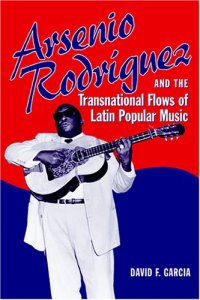
Ebook: Arsenio Rodríguez and the Transnational Flows of Latin Popular Music
Author: David F. Garcia
- Genre: Art // Music
- Tags: music history, afro-cuban jazz, salsa, latin music
- Series: Studies In Latin America & Caribbean Music
- Year: 2006
- Publisher: Temple University Press
- City: Philadelphia
- Language: English
- pdf
ARSENIO RODRIGUEZ (1911-70) was one of Cuba’s most important composers and musical innovators of the twentieth century. Since the late 1930s, Arsenio’s music has continued to make an indelible impact on a broad range of musical styles from the Caribbean and Latin America to West and Central Africa and beyond.' In the early 1940s Arsenio created the son montuno genre with his innovative conjunto ensemble, and by the 1950s Benny Moré, Ernest “Tito” Puente, and other Cuban, Puerto Rican, and Latin big band leaders had adopted the son montuno genre into their repertories, bringing it to a broader international audience. Contemporary musicians readily admit to the significant impact the music of Arsenio and his successors has had on their approach to performing Cuban and Latin dance music.
In addition to inspiring composers, arrangers, and musicians, Arsenio’s music has been performed and rerecorded by musicians of various musical backgrounds, most recently by the Afro-Cuban All Stars, Manuel “Guajiro” Mirabal, and Rubén González of the internationally famous Buena Vista Social Club. In fact, González performed and recorded with Arsenio”s conjunto in Havana from about 1945 to 1946. In the liner notes to his CD Chanchullo (World Circuit/Nonesuch 79503-2), Gonzalez is quoted as saying: ‘‘[Arsenio] taught me many things; to always think about a solo before playing it, never to play the same thing twice and never depart from the rhythm.”’ Experimental jazz guitarist Mark Ribot has recorded two CDs of Arsenio’s music reworked for a jazz combo.”
This book is the first scholarly work to document and analyze Arsenio Rodriguez’s career and music. The author is particularly interested in addressing the conflict in his volatile professional career and his music’s long-term significance to Cuban and Latin popular music history. Although Arsenio’s recorded repertory and son montuno style shaped transnational musical trends—from mambo in the 1940s and 1950s to salsa in the 1970s—his own professional viability beyond local music cultures in the Caribbean and the Cuban diaspora remained tenuous throughout his career.
In addition to inspiring composers, arrangers, and musicians, Arsenio’s music has been performed and rerecorded by musicians of various musical backgrounds, most recently by the Afro-Cuban All Stars, Manuel “Guajiro” Mirabal, and Rubén González of the internationally famous Buena Vista Social Club. In fact, González performed and recorded with Arsenio”s conjunto in Havana from about 1945 to 1946. In the liner notes to his CD Chanchullo (World Circuit/Nonesuch 79503-2), Gonzalez is quoted as saying: ‘‘[Arsenio] taught me many things; to always think about a solo before playing it, never to play the same thing twice and never depart from the rhythm.”’ Experimental jazz guitarist Mark Ribot has recorded two CDs of Arsenio’s music reworked for a jazz combo.”
This book is the first scholarly work to document and analyze Arsenio Rodriguez’s career and music. The author is particularly interested in addressing the conflict in his volatile professional career and his music’s long-term significance to Cuban and Latin popular music history. Although Arsenio’s recorded repertory and son montuno style shaped transnational musical trends—from mambo in the 1940s and 1950s to salsa in the 1970s—his own professional viability beyond local music cultures in the Caribbean and the Cuban diaspora remained tenuous throughout his career.
Download the book Arsenio Rodríguez and the Transnational Flows of Latin Popular Music for free or read online
Continue reading on any device:

Last viewed books
Related books
{related-news}
Comments (0)